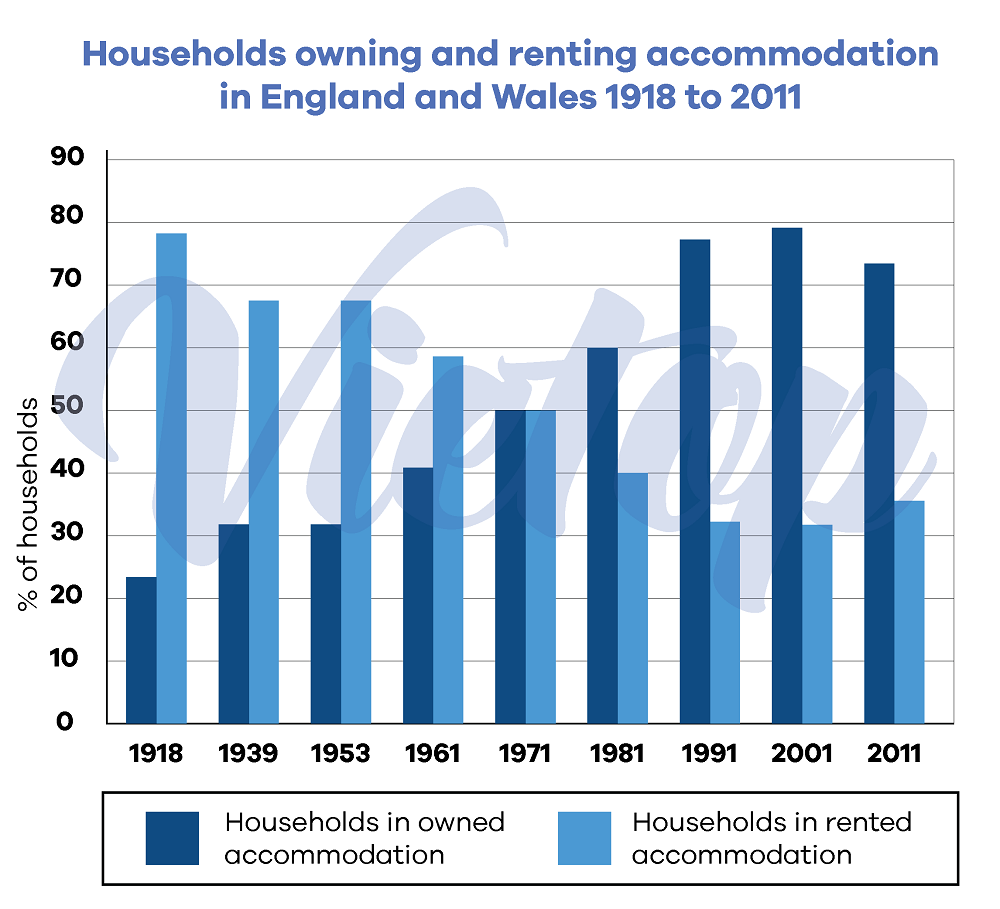Đề luyện tập IELTS Writing số 3: The percentage of households in owned and rented accommodation & Research the history of one’s own family
IELTS Writing không còn là nỗi sợ chỉ với bộ đề luyện tập IELTS Writing số 3: The percentage of households in owned and rented accommodation & Research the history of one’s own family. Xem và lưu lại ôn luyện ngay nhé!
Task 1

Đề bài
The chart below shows the percentage of households in owned and rented accommodation in England and Wales between 1918 and 2011.
Summarise the information by selecting and reporting the main features, and make comparisons where relevant.
Write at least 150 words.
Sample
The bar chart sets out two accommodation statuses of households in England and Wales from 1918 to 2011. Units are measured in percentages.
The initial impression from the chart is that from 1918 to 1961, a larger percentage of families in England and Wales resided in rented accommodation, whilst during the 1981-2011 period, more people owned houses. 1971 was the only year in which the ratio between the two modes was 1:1.
In 1918, around 23% of the families in the UK lived in their own houses, whereas the figure for rented accommodation was more than three times higher, at roughly 77%. From 1939 to 1961, the discrepancy was gradually reduced as there was an upswing in ownership and a decline in rentals. In 1971, the figures for the two housing statuses became even, amounting to 50%.
The period from 1981 to 2011 witnessed a shift between ownership and rentals. The figure for owned accommodation was higher than that for rentals (60% versus 40%) in 1981, and whilst the former saw a somewhat steady rise to nearly 80% in 2001, the latter fell to approximately 31%. Finally in 2011, although the ownership rate went down to 65%, it was still much higher compared to the proportion of rentals (37%).
Để làm được bài mẫu trên một cách tốt nhất, bạn có thể xem thêm: https://www.ieltsvietop.vn/tu-hoc-ielts/writing/cach-lam-dang-bai-bar-chart/
Vocab
- Set out: mô tả chi tiết
- Initial impression: ấn tượng ban đầu
- Discrepancy: khoảng cách
- Upswing: sự gia tăng
- Amount to: đạt được
Task 2
Đề bài
In some parts of the world it is increasingly popular to research the history of one’s own family. Why do people want to do this? Is it a positive or negative development?
** Dạng đề này khá “căng” nên các sĩ tử “cẩn trọng” ôn kĩ nhé!
Sample
Genealogy – the study of family history – has recently enjoyed increasing popularity in several countries in the world. There are several reasons for this, and I believe it is a positive development.
Curiosity might be one of the reasons why people take interest in such study. It is often fun and intriguing to trace back one’s bloodline to find out whether one is descended, either directly or indirectly, from a royal family or any prominent figures in the past. I still remember the excitement when I attempted to seek online the origin of my family name with the hope of finding a link, albeit vague, between me and the famed Chinese poet Du Fu. Also, to some war-stricken families, this family history research is more than just mere curiosity. With the power of the Internet, those who have lost contact with their close or distant relatives during wars may reunite with their family members by researching into their own family tree.
Genealogy offers several distinct benefits. For young amateurs, it is a fascinating way to learn how to systematically collect, organize and analyse data. For older people, it is a great leisure activity to while away the time, and a relevant source of family stories to tell their children. In addition, by learning about our ancestors, we may be able to gain a thorough insight into our own family-specific traditions, customs and titles. For example, one may be able to explain why there is always a fixed middle name in each of their family member’s full name if they learn about how the name originated in the first place. Finally, with an element of luck, one may find their long-lost relatives whom they have never met before, and indeed, there are many articles that retell such miraculous reunions.
In conclusion, researching one’s family line stems from two main aforementioned reasons, and I think it is a very interesting activity that should be encouraged.
Xem thêm: Cách tìm ý tưởng cho Writing Task 2
Vocab
- Genealogy: nghiên cứu gia phả
- Intriguing: thú vị, kích thích
- Be descended from: có dòng dõi
- War-stricken: có chiến tranh
- Systematically: có tính hệ thống
- Insight: cái nhìn sâu sắc
- Miraculous: thần kỳ
IELTS Vietop hy vọng hai bài mẫu trên sẽ giúp ích được các bạn trong quá trình luyện thi IELTS tại nhà trong mùa dịch. Nếu có gì thắc mắc về bài viết, hãy để lại bình luận bên dưới để được giải đáp nhé! Chúc bạn đạt điểm cao như mong muốn.
source https://www.ieltsvietop.vn/tu-hoc-ielts/writing/de-luyen-tap-ielts-writing-so-3-the-percentage-of-households-in-owned-and-rented-accommodation-research-the-history-of-ones-own-family/
Nhận xét
Đăng nhận xét